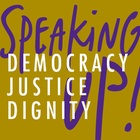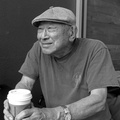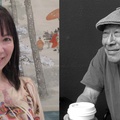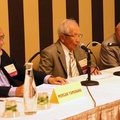Read Part 1 >>
I was having the time of my life, working a few hours a day as a dishwasher in the mess hall and devoting the rest of my time to what I loved—acting, reading, writing, and meeting people with similar interests. Camp life was great. But it all came to an abrupt end in February 1943 with the so-called “loyalty registration,” which was a joint order by the Army and the WRA to facilitate the Army in recruiting volunteers and the WRA in moving us out of camp. All male and female internees seventeen and older were ordered to answer a series of questions in a “Statement of United States Citizenship of Japanese Ancestry,” of which the key questions were question 27 and 28:
No. 27: Are you willing to serve in the armed forces of the United States on combat duty wherever ordered?
No. 28: Will you swear unqualified allegiance to the United States of America and faithfully defend the United States from any or all attack by foreign or domestic forces, and forswear any form of allegiance or obedience to the Japanese Emperor, to any other foreign government, power or organization?
We refused to register. At the beginning most of the people at Tule Lake were against the registration order. Confused over the questions, we went around to see what the others were doing. In our family, the decision became unanimous; mother’s primary concern was to keep us together. Her great fear was that if we registered we would be forced out of camp and drafted by the Army. If my father had been with us, I don’t know what we would have done, what his decision would have been. I know it would have been much easier for us; he would have made the decision and we would either follow it or not.
My position was this—why was I, an American citizen, thrown in prison without cause, without due process? Why were they questioning my loyalty? I was an American, a loyal American. If they restored my status as a rightful citizen, let me go free, out of this prison, I would do anything required of me. Why should I answer the ambiguous questions? I would follow my conscience and refuse to register.
To underscore the compulsory nature of the registration, we were warned that non-compliance was a violation of the Espionage Act with penalties of twenty years in prison, a $10,000 fine or both. The Project Director with Army officers came to key mess halls and read off names of draft-age men expected to register.
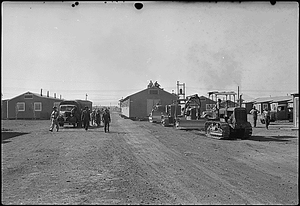
Moving a 100-foot, 32-ton barrack office building in Tule Lake (Source: Central Photographic File of the War Relocation Authority U.S. National Archives, Record group 210)
Block 42, a neighboring block, was one of the first blocks ordered to register. Most of the young men there had signed up for repatriation to Japan. That was ironic, as they were all citizens of this country. As a reprisal, the Administration picked them first to register. When no one appeared at the block office on the designated day, the authorities took action. Around 5 o’clock in the afternoon, the mess bells rang out urgently and alarmingly, announcing the arrival of the soldiers to round up the recalcitrant evacuees. The young men who already had their suitcases packed were forced at bayonet point onto the Army truck. Everyone was outraged and emotions ran high. Mothers, girlfriends, brothers, and sisters were tearfully bidding goodbye to the young men who were being taken to the county jail outside of camp. This show of force by the Administration was meant to break down our resistance, but it only hardened our resolve. We returned to our apartment to pack our bags and wait to be taken away.
But the Block 42 men were soon released because the WRA had no cause to hold them. We continued to resist and nothing happened. Years later, I was devastated to read that the registration order had not been compulsory, that there was nothing compelling us to register: a fact that the Administration never disclosed to us. To this day, many Nikkei believe that the order had been compulsory. Furthermore, the threat of 20 years in jail and/or $10,000 fine for non-compliance had been just that: threats. Laboring under these conditions, fearful and uncertain, we refused to register. As a consequence, we were held at Tule Lake when it became Tule Lake Segregation Center. And we became known as the infamous “No-No Boys.”
I didn’t know what my fate would be. I was hopeful that nothing drastic would happen. I had no intention of going to Japan; since they would not release me, I was going to sit out the war in camp. I just wanted to be who I was—a Japanese American, an American of Japanese descent, an American. Obviously, I was not pro-Japan even though I could read and write Japanese; I was more advanced in Japanese language than those who were hastily trained at the military language schools were. With my language skill I realize I could have been very useful to my country. I could have served in the Military Intelligence Service as many Kibei and Nisei did with great distinction. If only my country had been more fair and trusting….
But renunciation was another thing. When I heard talk of it, I felt it was only for pro-Japan fanatics; certainly, not for me. I tried not to concern myself with it. I didn’t think it would happen to me, but it did. Unknowingly, I was swept into it, succumbing to the pressure—both outside and within our own family. I was influenced by a family friend whose wife and children were in Japan and who was planning to join them after the war; it was natural for him to be pro-Japan. He came over every day; I tried not to listen to him but I guess he was an influence. Though I didn’t agree with him, I didn’t want to defy him; I was lazy; I didn’t want to think; I didn’t want to confront the problem and make a decision; to put my foot down and assert my real feelings. I thought it would just go away. For my refusal to face reality, I was to pay dearly.
Then one day my brother forced the issue. “Are we Americans or are we Japanese? Let’s make it clear.” I gave in.
Renunciation was totally unnecessary. We had already made our protest known by not registering. To give up our citizenship was stupid and redundant. I always thought that I had brought it on myself but actually it wasn’t my fault at all; the government had accommodated us by passing a special legislation, making it easy for us to renounce and we fell for it; again I was betrayed by not only the fanatics who agitated for it but also by my own government for willingly allowing it.
After I was released in early March of 1946, I realized for the first time that during the three and a half years I had done nothing to further myself. What had I done? Well, I played a lot of card games—hours of pinochle—so much so that today I can’t stand to look at cards. The picnic tables in the mess hall left me with a permanent aversion for them, even at picnics. What else? I learned to smoke; this was at a time when cigarettes were scarce and we went around mooching off one another. After fifteen years I struggled to give up the habit. I didn’t even get married. I should have married and started a large family at government expense, but I guess I was a bit young. So for three and a half years, I was just existing, vegetating, enduring, surviving, and hanging on to…to what? To my sanity…something I would never admit.
I lost all initiative to do anything new or daring, sticking to the familiar daily routine. Why? I think I was barely hanging on. If I took a moment to think, wavered from my routine, I think I would have fallen apart. I guess this is what it’s like to be incarcerated. Playing baseball with others like myself helped while I was involved in the game but after it was over it was back to bleak, numb reality.
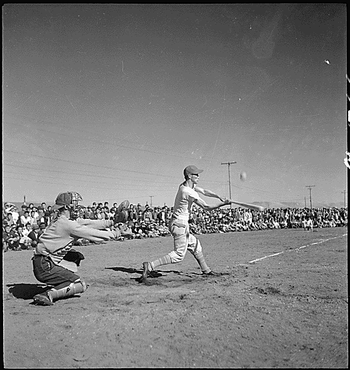
Baseball in Tule Lake. (Source: Central Photographic File of the War Relocation Authority U.S. National Archives, Record group 210)
I feel I have paid many times over for the position I took at Tule Lake. Certainly, you don’t go around telling people you spent time at Tule Lake during the war. You try to push that back somewhere and not think about it; you try to block out that part of your life, but you have to live with it. You try to find a niche in society and hope that no one will pry into your past.
Living under such pressure, it’s inevitable that there should be doubts and questions about your actions and feelings of guilt. Did I do something bad or wrong? If the circumstances were to be repeated, how would I act? I would take the same position I took as a young man back in 1943. Only this time, there would be no doubt, no hesitation, and no confusion. I would have the advantage of hindsight and I would definitely protest, no matter what the cost.
*This article was originally published in Swimming in the American, a Memoir and Selected Writings, San Mateo, CA, Asian American Curriculum Project, 2005.
© 2013 Hiroshi Kashiwagi


